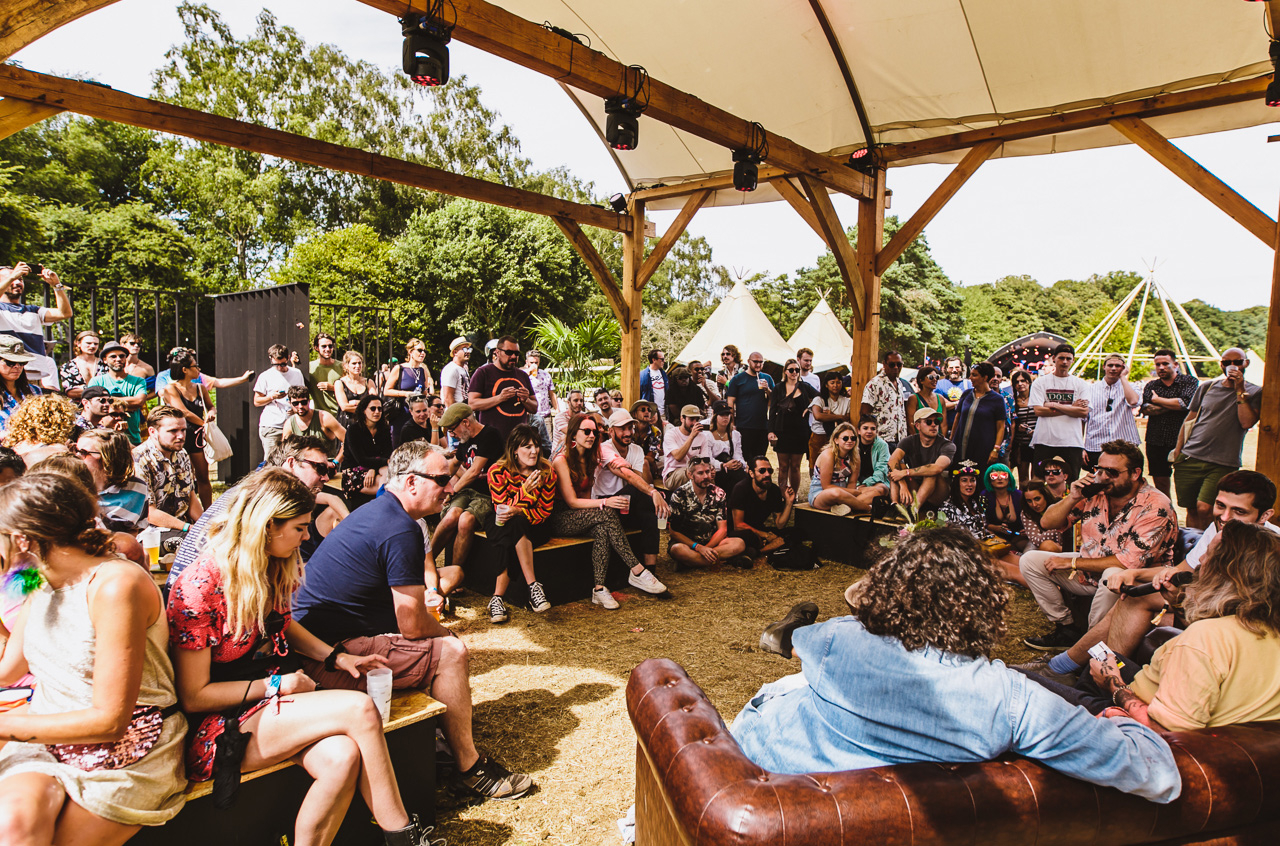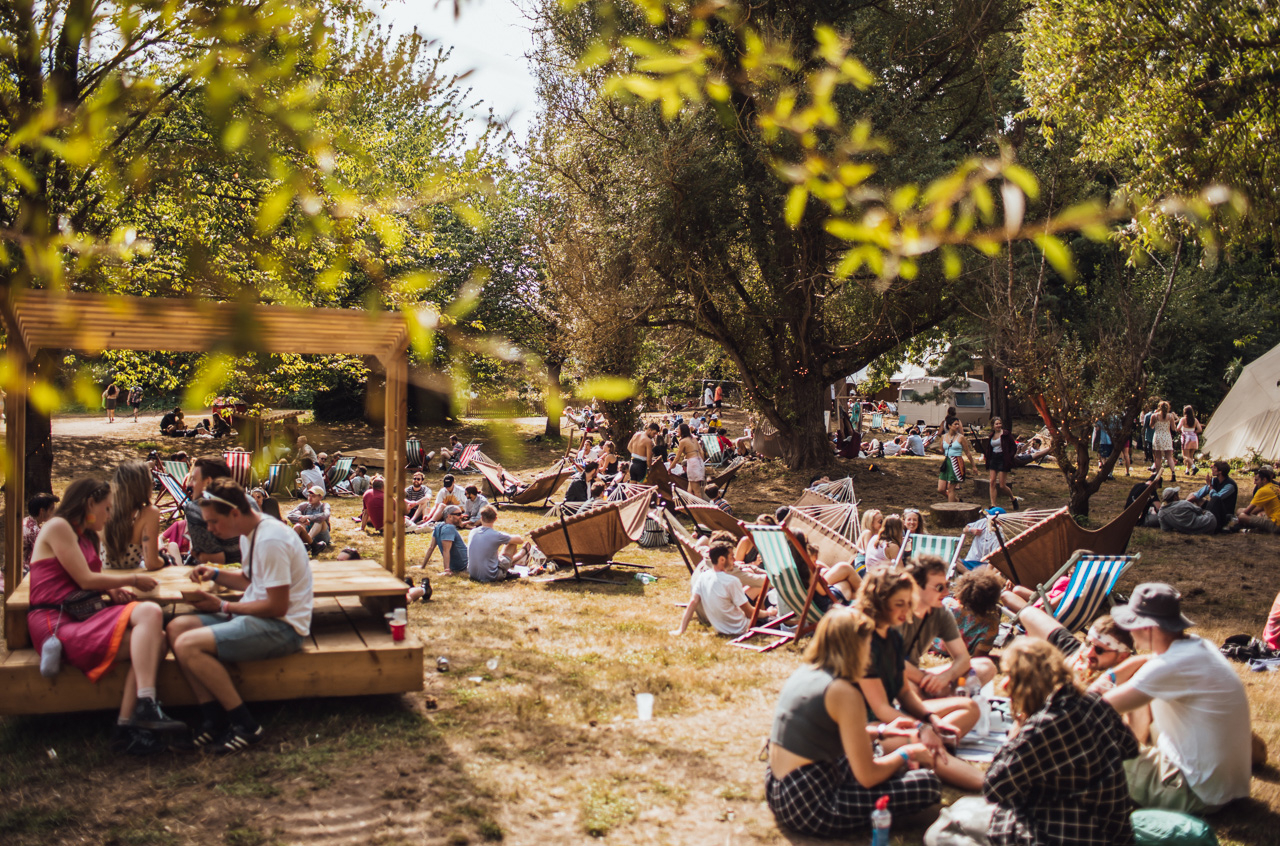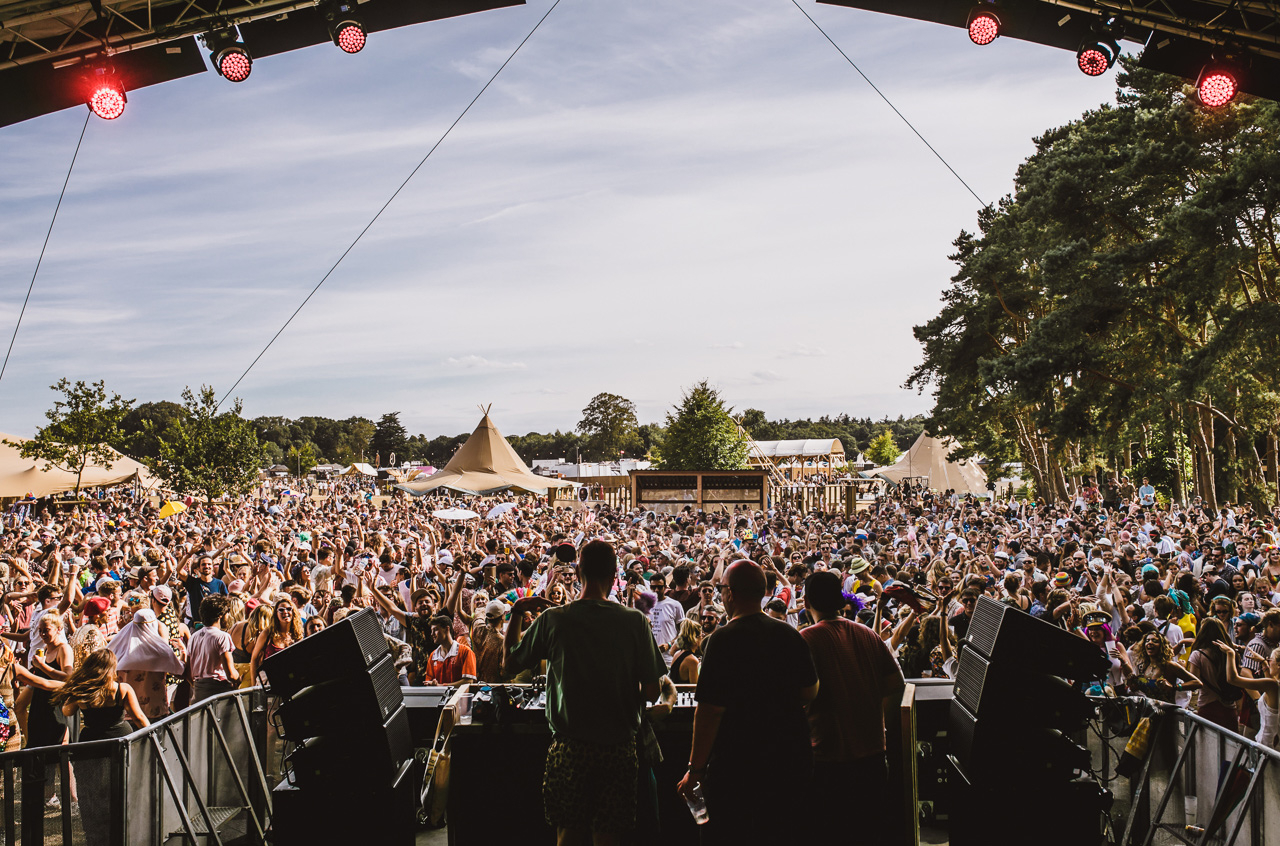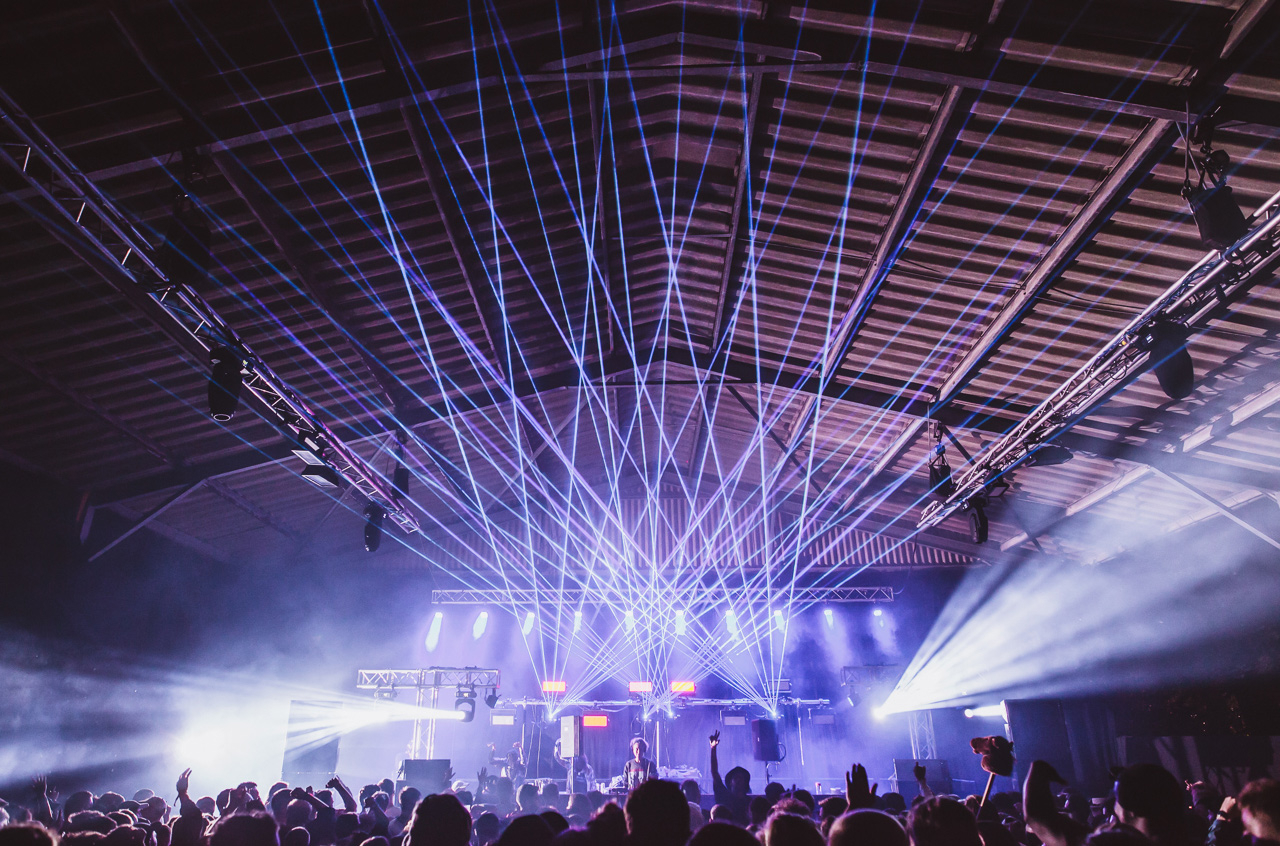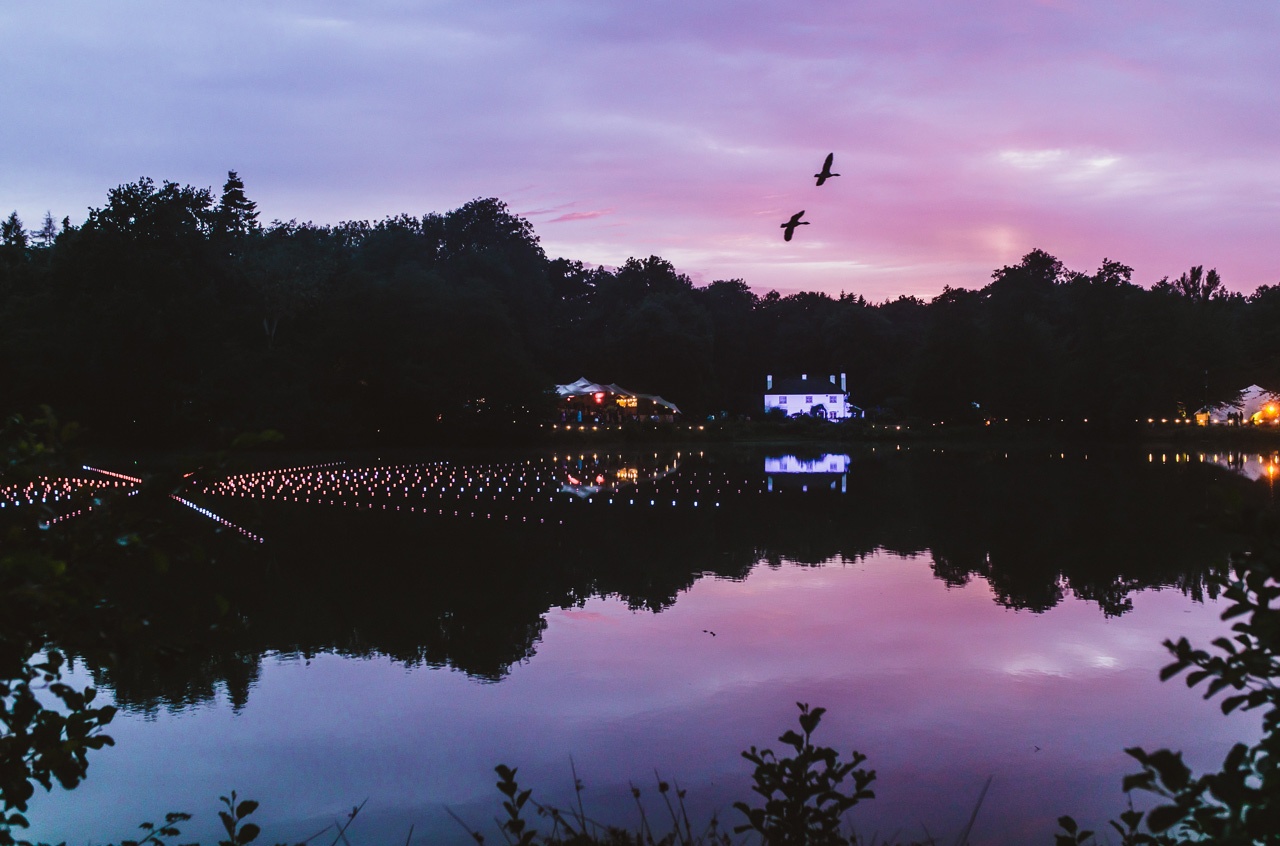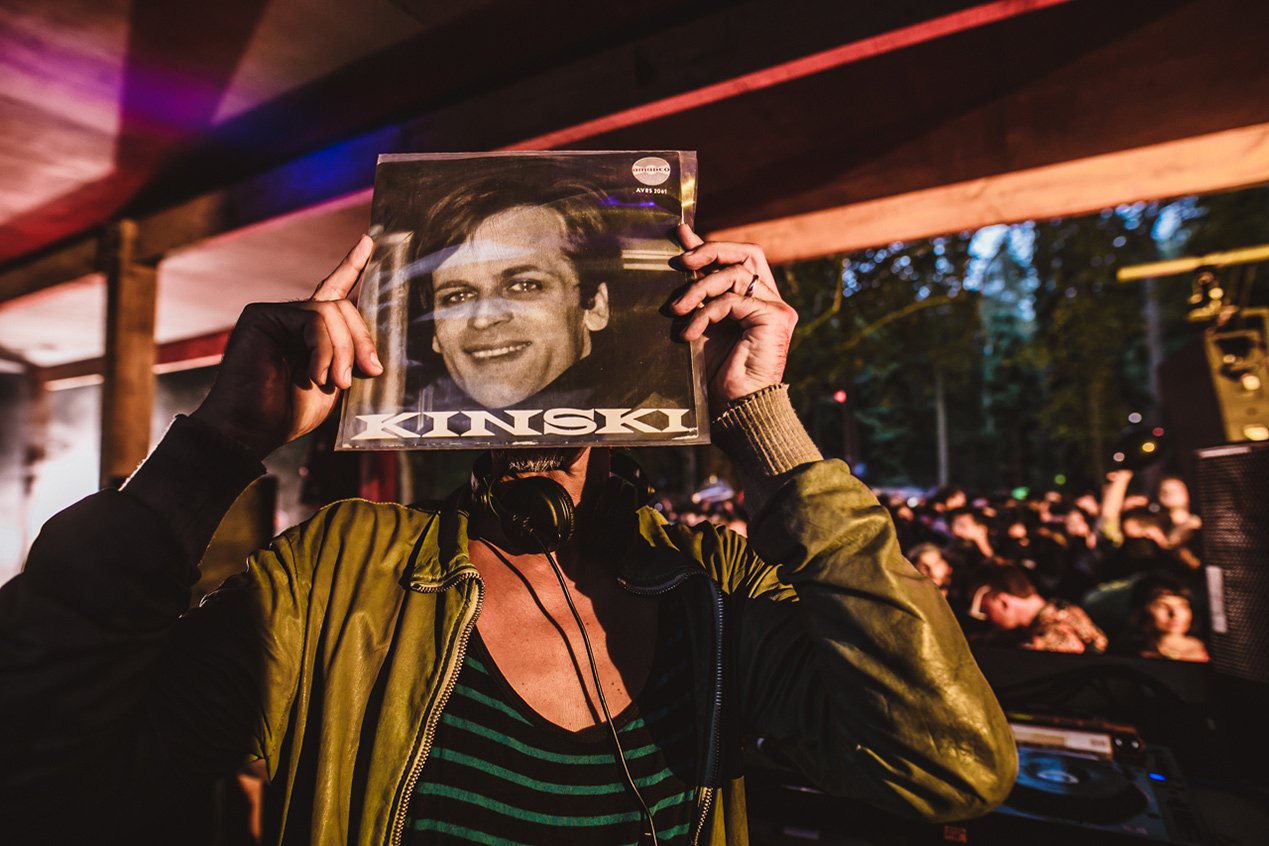Photo credit /
Ricardo Villalobos - Daisy Denham, Jake Davis
Horse Meat Disco, Giant Steps, lake - Jake Davis
Margaret Dygas - Daisy Denham
Picnic - Christopher Werrett
Houghton Festival 2018: Five key performances
- PubliéAug 15, 2018
- Mots
- The "dream festival" returns for its second edition.
- Partager
- On Saturday afternoon, Houghton Festival's idyllic countryside setting was working its magic. At the tree-lined Derren Smart stage, a couple in their 30s wore number plates decorated with string-tied disposable cups; when they stood together the plates read "Just Married!" Another couple in a nearby hammock rocked gently to Horse Meat Disco. To their left, a tranquil, panoramic lake drew admiring gazes (and iPhone clicks) from passersby. Two lovers wearing brimmed hats held each other on the bank, as still as the water beyond them. What was it about Houghton, a four-day, round-the-clock dance music festival, that made people feel so at ease?
Some of that was down to Houghton's curator, Craig Richards, whose thoughtful touches made the festival much more than a rave in a field. His distinctive artwork spanned the entire site, which gave the festival a symmetry of sorts with Houghton Hall, the 18th century Palladian house whose sculpture park you could tour. Two arenas—Trevino's and the Derren Smart Stage—were named after dear, deceased friends. The range of things you could do at Houghton—life drawing, record shopping, yoga, whatever "Yamuna body rolling" is—went far beyond the scope of the usual festival offering.
Though there were performances from the Ethiopian jazz artist Mulatu Astatke and the Lebanese indie-folk band Mashrou' Leila, the programming skewed towards a mix of British DJs and minimal superstars—Binh, Nicolas Lutz, Sonja Moonear, Ricardo Villalobos, Magda, Zip—so beloved at fabric, where Richards has been a resident since 1999. The DJs often played twice and for extended periods, which suited the patient style of Richards and Villalobos. ("Playing in a big tent, banging the hell out of it... It's not really me," Richards once said.) The lack of phone reception also enhanced the immersive, easygoing nature of the experience. People seemed more prepared to stay at sets instead of constantly searching for friends.
But this still doesn't fully explain Houghton's X factor. There was an air of extravagance about the whole weekend that was sometimes beyond imagination. Terminus, a sort-of-secret stage beyond the campsite, was reachable either by foot or a train that left every hour. At Trevino's, among the record shelves, sofas, bar and DJ booth, was a £40,000 audiophile hi-fi with the Erykah Badu album Mama's Gun spinning on a rare Technics SL-10 turntable. At The Nest, one of two pop-up restaurants, you could enjoy a three-course meal overlooking the lake.
Was Houghton always perfect? The toilets were in bad shape on Sunday. The beer was expensive. And they could have done with a few more water points. But these are easy things to fix. Houghton is among the world's most beautiful festivals, and it's clear why the challenge of curating it energised Richards so much. "As soon as I saw [the site] my imagination ran wild," he told RA in 2016. Houghton is essentially Richards' dream festival. By all accounts, many others felt the same.
Here are five key performances from the weekend.
Call Super On the bus to the festival, a fellow passenger, cradling a can of Pimm's, sprang to life as we steered past the gates of Houghton Hall. "Oh my God, look at this perfect weather, everyone!" she said, as the orange sun set below slouching tree branches. Had she been at Call Super's set at the Quarry late on Saturday night, she, like many others, might have fled the scene. It was the stage most exposed to the elements, and it had been pissing it down for several hours. About a hundred people, clutching their umbrellas and windbreaker hoods, toughed it out on the muddy, sloping dance floor, with roaming beams and lasers scanning the space. Call Super, AKA Joe Seaton, caught the mood immediately—the first 90 minutes was an aggy mix of hardcore, breakbeat and UK garage. (The transition from Smokin' Cheeba's "When I Was A Youth" to Jay Bee's "Mysterious" was inspired.) The Quarry got much busier. Shafts of light shot through the music. A ravey piano banger lifted spirits, as did a remix of "Strings Of Life" (possibly the Flam-Boy-Ant version). Seaton dove into other classics: he teased in "The Bells" (for a little too long, the eventual drop felt anticlimactic), and Underworld's "Pearl's Girl," which, with its thick synth chords, felt like a quintessential Call Super track. It was possibly my favourite moment of the whole weekend.
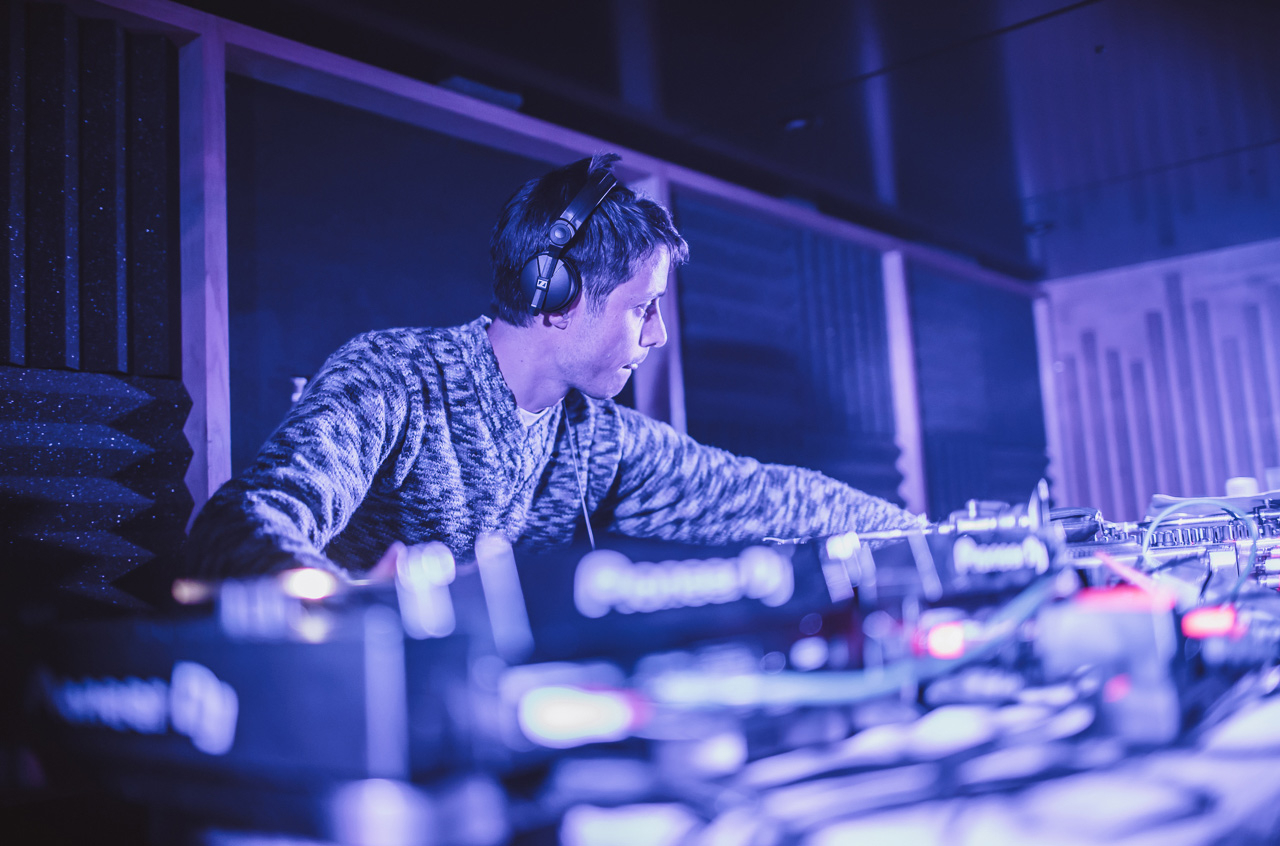 Donna Leake The Giant Steps stage was one of Houghton's best chill-out spots. The yurt's cosy interior—four atlas-like lamps, cushions surrounding the dance floor, lots of foliage—was an ideal place to relax without having to retreat to the campsite. It had been quiet for most of Saturday, but that night, when Donna Leake played the first of two sets, the dance floor was filling up nicely. Leake, wearing a mustard-yellow coat and gold-rimmed shades, was as cool as her records were expressive: she made conductor-like gestures and tapped out drum fills with the air of someone who'd heard these tracks a thousand times. The music, save for a couple of dub jams at the end, cleaved to synthy '80s funk and jazzy fusion, sometimes with big sax solos. The dance floor got even busier, and things began to unfasten. One guy fell over and knocked down a plant to the right of the booth. At the front, a few young lads pumped their fists to the hour's biggest hit, a long, psychedelic bit of sax-and-Rhodes funk. They took turns to crane over the turntable. It was "Shamal," by Gong.
Donna Leake The Giant Steps stage was one of Houghton's best chill-out spots. The yurt's cosy interior—four atlas-like lamps, cushions surrounding the dance floor, lots of foliage—was an ideal place to relax without having to retreat to the campsite. It had been quiet for most of Saturday, but that night, when Donna Leake played the first of two sets, the dance floor was filling up nicely. Leake, wearing a mustard-yellow coat and gold-rimmed shades, was as cool as her records were expressive: she made conductor-like gestures and tapped out drum fills with the air of someone who'd heard these tracks a thousand times. The music, save for a couple of dub jams at the end, cleaved to synthy '80s funk and jazzy fusion, sometimes with big sax solos. The dance floor got even busier, and things began to unfasten. One guy fell over and knocked down a plant to the right of the booth. At the front, a few young lads pumped their fists to the hour's biggest hit, a long, psychedelic bit of sax-and-Rhodes funk. They took turns to crane over the turntable. It was "Shamal," by Gong.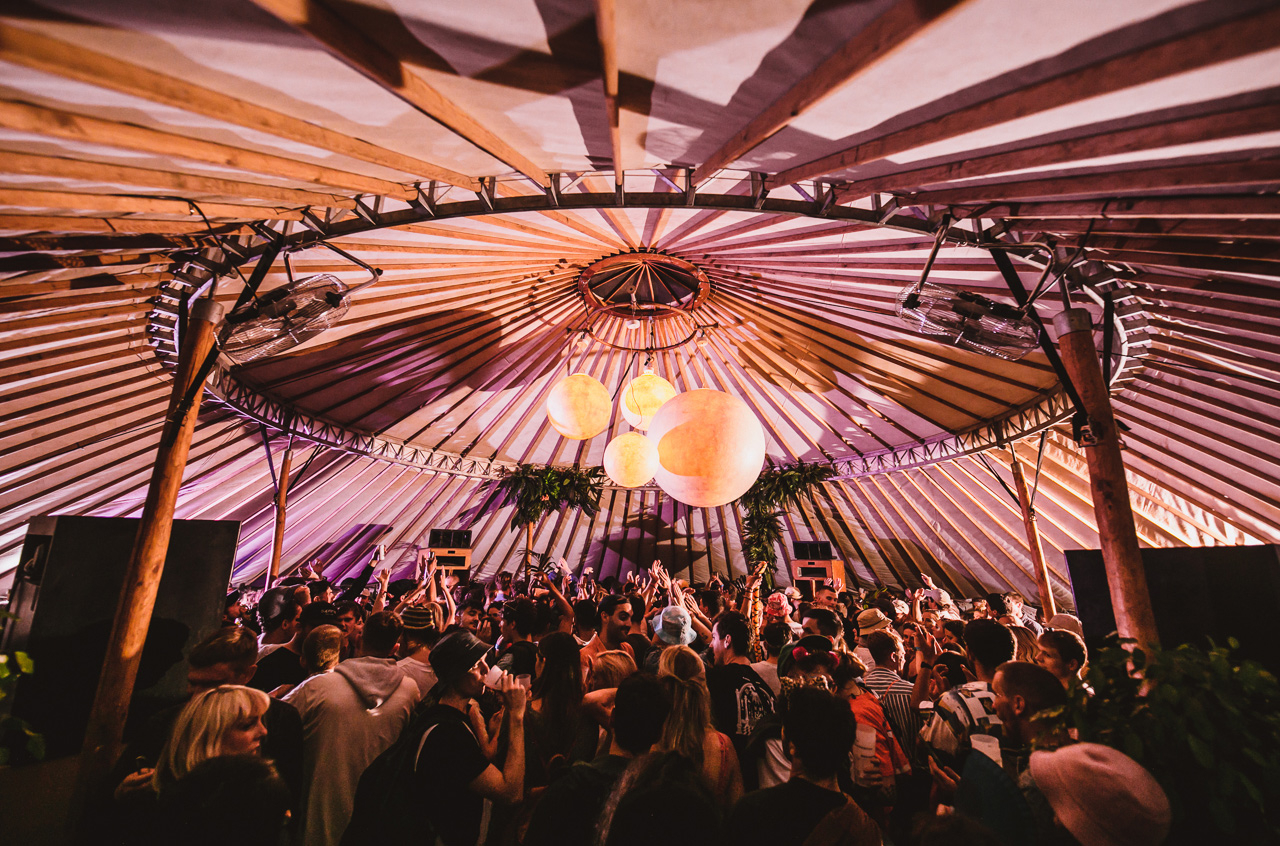 Ricardo Villalobos Ricardo Villalobos's back-to-back set with Craig Richards was the highlight of Houghton's spectacular opening edition. But if anything, his performance this year was more impressive. My friend, a huge Villalobos fan who's seen him around 30 times, said he'd never seen him play better. The set was full of the mind-fuckery that only Villalobos can get away with. Fader flicks, random volume dips, bizzare acapellas, sound effects—these are staples on any Villalobos set. But this was one of the rare times he totally nailed every move. He looked liked he was relishing messing with the early-morning crowd, playing unpredictable music in a totally inimitable way. A good example was the point he dropped an old Derrick Carter track three times in a row, while manipulating the sound of a hurtling steam train. Other times he would run several records into epically long minimal tracks. He teased in Floorplan's "Never Grow Old" for around eight minutes before finally playing the record in full while still manipulating the track on a second deck, turning the well-worn classic on its head. I've never seen a crowd enjoy the track so much. Seeing Villalobos playing in the woods at dawn, it seemed as if the entire festival had been arranged just so this set could take place. As the sun rose from behind the DJ booth, the morning light glinting off the lake, a purple smoke flare was set off. The dance floor filled with thick violet fog and the crowd cheered. It was a special moment in a truly special set.
Ricardo Villalobos Ricardo Villalobos's back-to-back set with Craig Richards was the highlight of Houghton's spectacular opening edition. But if anything, his performance this year was more impressive. My friend, a huge Villalobos fan who's seen him around 30 times, said he'd never seen him play better. The set was full of the mind-fuckery that only Villalobos can get away with. Fader flicks, random volume dips, bizzare acapellas, sound effects—these are staples on any Villalobos set. But this was one of the rare times he totally nailed every move. He looked liked he was relishing messing with the early-morning crowd, playing unpredictable music in a totally inimitable way. A good example was the point he dropped an old Derrick Carter track three times in a row, while manipulating the sound of a hurtling steam train. Other times he would run several records into epically long minimal tracks. He teased in Floorplan's "Never Grow Old" for around eight minutes before finally playing the record in full while still manipulating the track on a second deck, turning the well-worn classic on its head. I've never seen a crowd enjoy the track so much. Seeing Villalobos playing in the woods at dawn, it seemed as if the entire festival had been arranged just so this set could take place. As the sun rose from behind the DJ booth, the morning light glinting off the lake, a purple smoke flare was set off. The dance floor filled with thick violet fog and the crowd cheered. It was a special moment in a truly special set.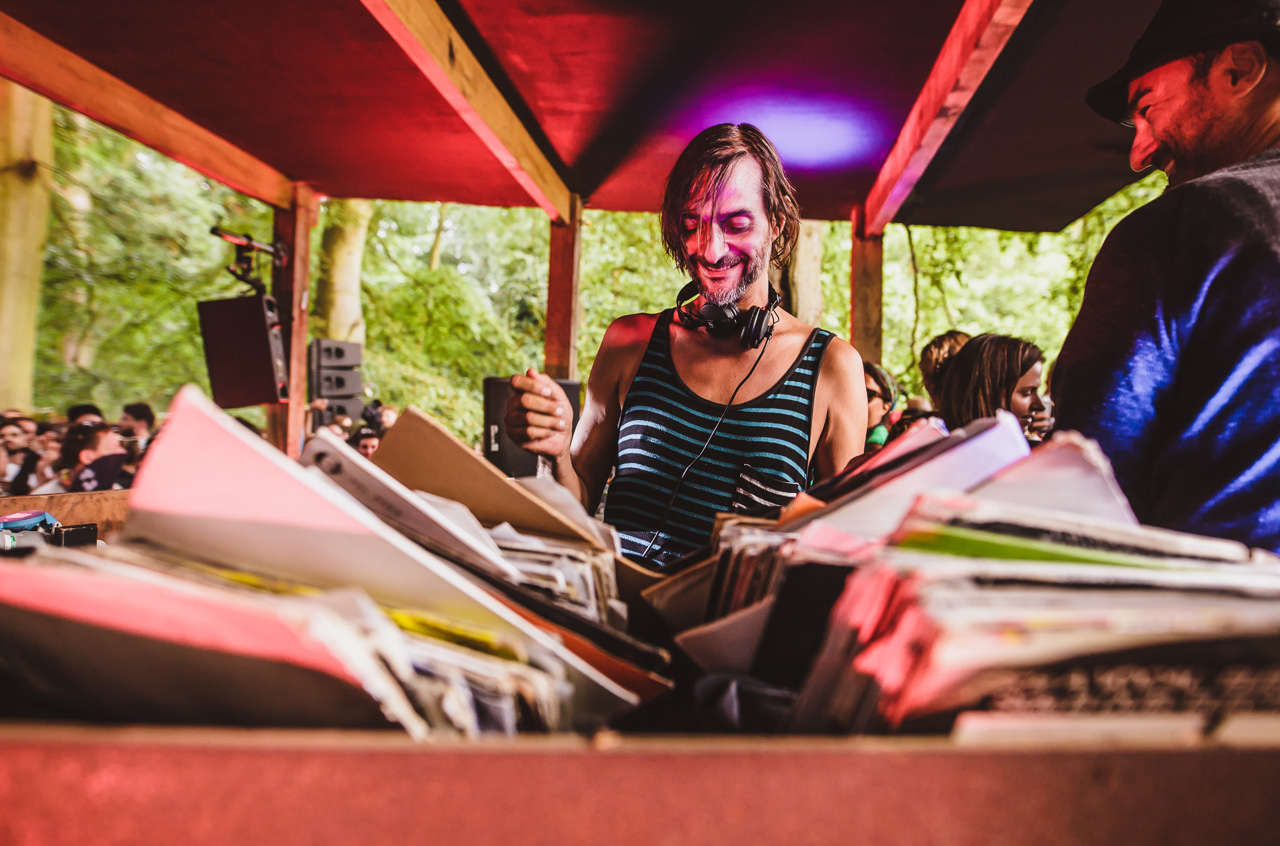 Horse Meat Disco Horse Meat Disco played to a packed crowd on Saturday afternoon. The four DJs played for five hours on the Derren Smart Stage, an area named in honour of the late London promoter and friend of Craig Richards. Smart's events at T-Bar pushed electro and disco at a time when the sounds were less popular than they are today. With acts like Mr. Scruff and Emperor Machine playing the stage, the programming felt like a fitting tribute. Horse Meat Disco's performance was unpretentiously fun, encompassing decades of soulful music. The vibe was joyful as the sun beamed down on a crowd that was filled with people in colorful outfits. Paradise Garage classics like Diana Ross's "No One Gets The Prize" got the crowd moving early on. Later, funky house bangers like Martin Solveig's remix of Salif Keita's "Madan" and Moloko's "Sing It Back" raised the temperature. Horse Meat have long had a reputation as ultra-reliable party starters. This set confirmed you're unlikely to go wrong when hearing them at a festival.
Horse Meat Disco Horse Meat Disco played to a packed crowd on Saturday afternoon. The four DJs played for five hours on the Derren Smart Stage, an area named in honour of the late London promoter and friend of Craig Richards. Smart's events at T-Bar pushed electro and disco at a time when the sounds were less popular than they are today. With acts like Mr. Scruff and Emperor Machine playing the stage, the programming felt like a fitting tribute. Horse Meat Disco's performance was unpretentiously fun, encompassing decades of soulful music. The vibe was joyful as the sun beamed down on a crowd that was filled with people in colorful outfits. Paradise Garage classics like Diana Ross's "No One Gets The Prize" got the crowd moving early on. Later, funky house bangers like Martin Solveig's remix of Salif Keita's "Madan" and Moloko's "Sing It Back" raised the temperature. Horse Meat have long had a reputation as ultra-reliable party starters. This set confirmed you're unlikely to go wrong when hearing them at a festival.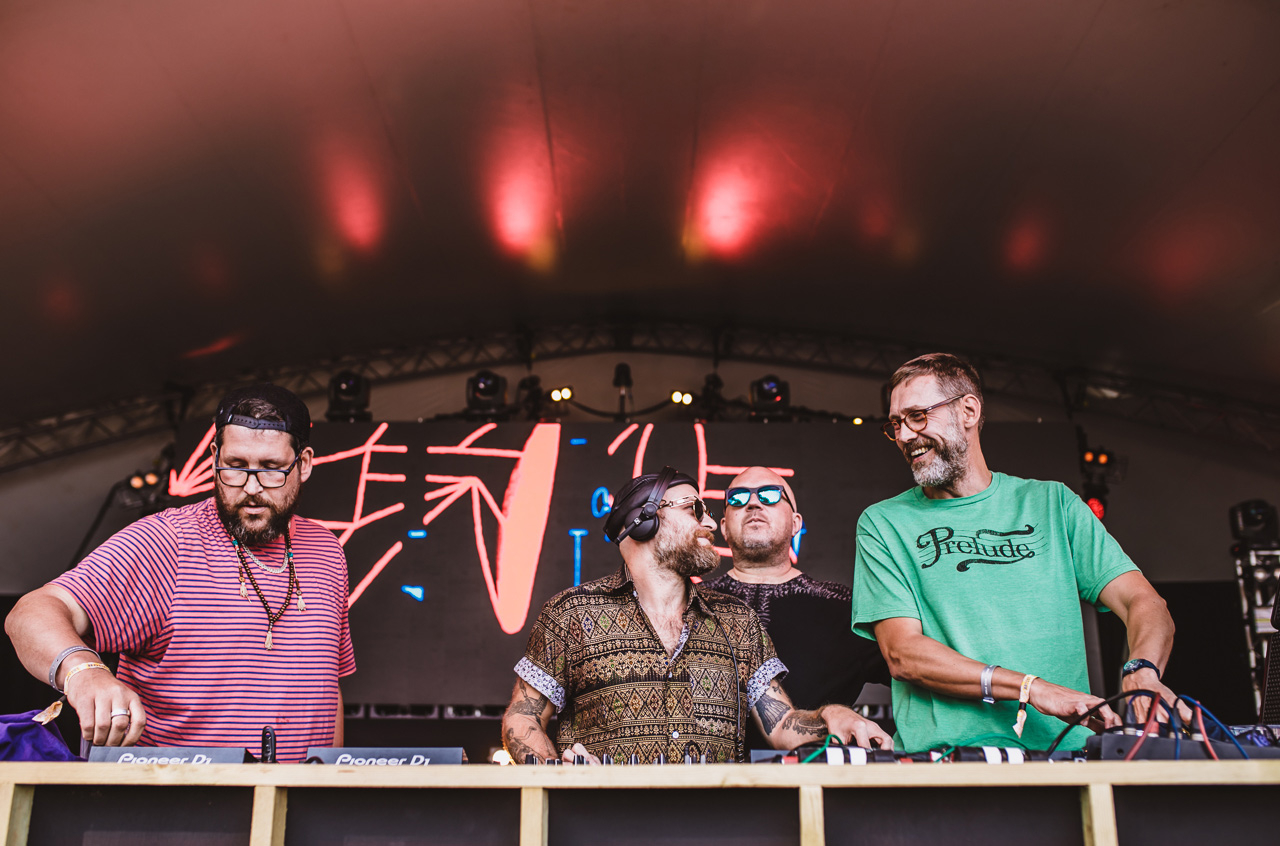 Margaret Dygas On Sunday morning in Old Grammophone, a tented stage among the food trucks, the 24-hour schedule began to take its toll. The sofas were full. One tired raver, wearing a white F1 jumpsuit and sunflower hat, slumped on a bench beside his consoling partner. Margaret Dygas, sensing the mood, played a note-perfect afterparty set. She began with deep and moody tracks full of understated pads and twisted basslines. Dygas was a calm, controlled presence throughout, sipping from cans of water and, on occasion, a bottle of whisky. A few DJs who had played earlier that morning were socialising behind her, including Zip, Sonja Moonear and Magda. She played a couple of welcome crowd-pleasers, including Omar S's "Thank U 4 Letting Me Be Myself" and Jungle Brothers' "I'll House You." Then the power cut out. Dygas kept her composure, as did most of the crowd, except one guy, wearing a matching Burberry shirt and cap, who said what we all felt: "Release the tunes!" A little later, midway through Lapien's "Something To Tell You," the power cut out again, and, with 20 minutes to go, things petered out. It was a disappointing end to an excellent set.
Margaret Dygas On Sunday morning in Old Grammophone, a tented stage among the food trucks, the 24-hour schedule began to take its toll. The sofas were full. One tired raver, wearing a white F1 jumpsuit and sunflower hat, slumped on a bench beside his consoling partner. Margaret Dygas, sensing the mood, played a note-perfect afterparty set. She began with deep and moody tracks full of understated pads and twisted basslines. Dygas was a calm, controlled presence throughout, sipping from cans of water and, on occasion, a bottle of whisky. A few DJs who had played earlier that morning were socialising behind her, including Zip, Sonja Moonear and Magda. She played a couple of welcome crowd-pleasers, including Omar S's "Thank U 4 Letting Me Be Myself" and Jungle Brothers' "I'll House You." Then the power cut out. Dygas kept her composure, as did most of the crowd, except one guy, wearing a matching Burberry shirt and cap, who said what we all felt: "Release the tunes!" A little later, midway through Lapien's "Something To Tell You," the power cut out again, and, with 20 minutes to go, things petered out. It was a disappointing end to an excellent set.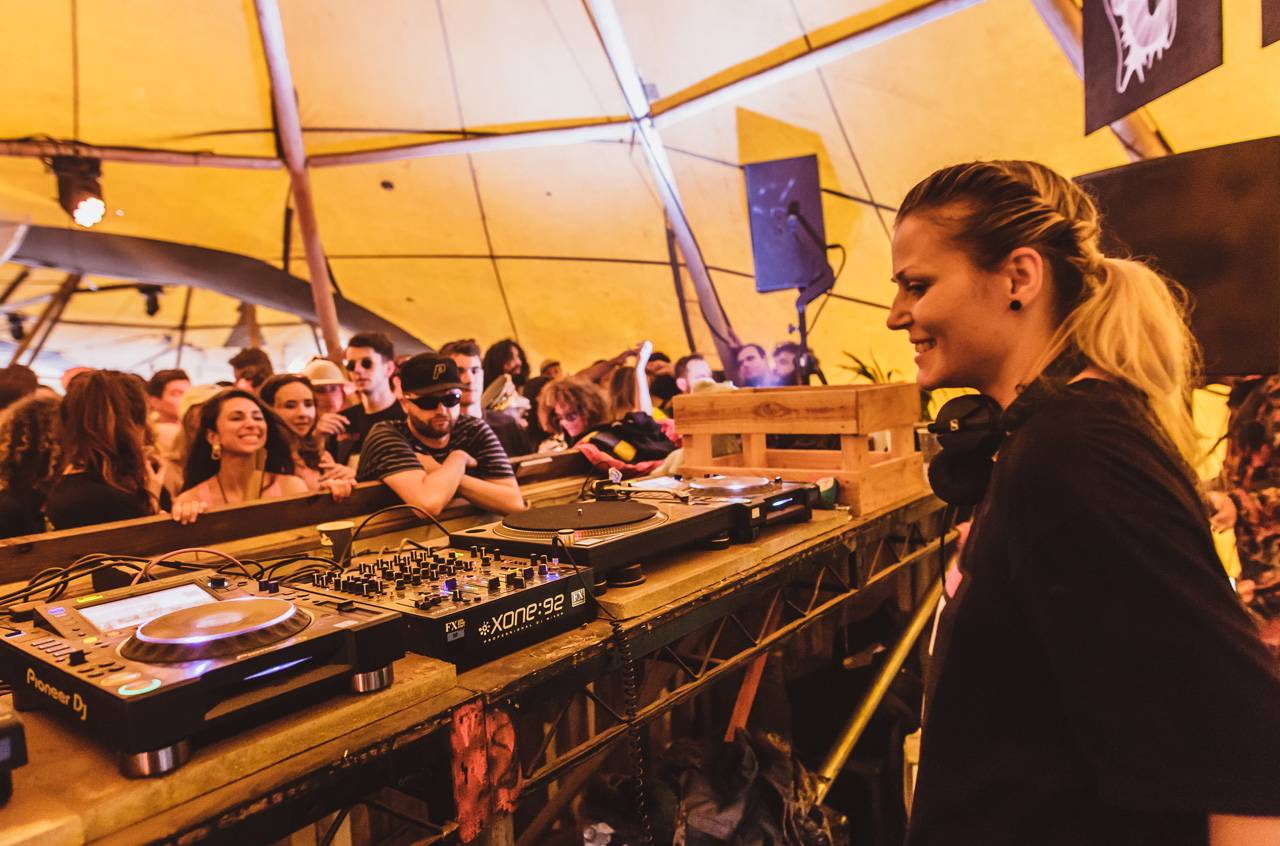 0303
0303